Annie Laurie Holfelder | 32 | they/them | Writer of no-spice, low-romance adventure fiction | HolfelderWrites.com | asexual aromantic agender | come talk to me, I'm friendly! :)
Don't wanna be here? Send us removal request.
Text
Author Ask Tag
@goodluckclove tagged me, and I really like these questions. I’m going to answer on my current main WIP, Wardens of the Veil: Haunt Club (working title). It’s a project that I am cowriting with a close friend. I am super excited about it!
Wardens of the Veil: Haunt Club follows Emmaline Byrne as she discovers the world of the Ancients and the Skilled – a world that her Aunt Kathy has hidden from Emmaline in order to protect the young woman. Emmaline must decide what to do when faced with the truth of her Ancient nature. Along the way, she is helped by a ragtag crew of Ancients and Skilled – including a displaced Cajun man with a penchant for staking vampires and a jack-of-all trades who is fluent in Pittsburghese and “changes genders like Emmaline changes shoes”.
What is the main lesson of your story? Why did you choose it?
Lesson? Hah. As if I planned any of this. I didn’t. We’re here because some friends and I started an RPG and I fell in love with the characters. The rest of the story has built up around the characters. I would say, though, that we have some overarching themes that my wonderful cowriter has been able to pick out. I’m a tree planter, she’s a pruner and planner. We work well together, because I plant ALL THE TREES and she prunes them back and teaches me to see the forest. These themes include facing your fears, healing from trauma, and accepting yourself. We did not choose these themes. The characters revealed them to us.
What did you use as inspiration for your worldbuilding?
Everything started with a RPG named Fiasco, the Supernatural Files. We created our characters around a fictional swamp town in Louisiana, but eventually moved to Pennsylvania. The setting change was mostly to “write what you know”, but soon sparked a massive plot overhaul that led to vibrant characters and legends. Anyhow, to answer the question … the worldbuilding scheme has been based on an amalgamation of all the fantasy and magic systems that either of us have read throughout our lives. There’s a touch of this and a touch of that. I somehow managed to create a Big Bad that resembles creatures from at least two different series that I have never read, so that’s fun.
What is your MC trying to achieve, and what are you, the writer, trying to achieve with them? Do you want to inspire others, teach forgiveness, or help the reader grow as a person?
Emmaline – who fits the category for Main Character, I suppose – is trying to understand her heritage and how that affects who she is now, when you strip everything else away. There’s a lot of personal growth, trauma healing, and learning to trust others that goes along with it. If I’m being completely honest, my Main Goal here is to give readers an enjoyable and meaningful escape from “real life”. Yeah, there are themes of forgiveness, redemption, healing, growth, and love (familial, platonic, romantic), and I do hope that readers will walk away feeling like this book was a fulfilling read. I don’t have a message to spread (other than acceptance of diversity) or a goal to fulfill (other than for the readers to have a good time). I write what I want to read, which is a fun, meaningful adventure story for adults. I’m here to write something that queer and racially diverse individuals can enjoy and see themselves in.
How many chapters is your story going to have?
*laughs in never-ending chaos* You expect me to know that? Hah. Nope. *shrug*
Is it fanfiction or original content? Where do you plan to post it?
OG Ba-by! I’ll be posting snippets, character blurbs, and other thoughts on Patreon and occasionally here (feel free to comment or send asks!). The book itself is slated to go to various literary agents. I’m hoping this will be my debut – I believe in it so much and honestly? It’s shaping up to be pretty awesome. 😊
When did you start writing?
That’s a long story. I’ll try to make it short. I started when I was a preteen. Tried to write a book when I was a teen – that book was the foundation for Tapestry of Hope/Severed Threads – but abandoned it when I was fifteen or sixteen. I assumed I was terrible and writing and would never make it, so I quit writing for years. I took a creative writing class in my senior year of college (2016), but focused mainly on my poetry. Then in late 2018, I discovered the world of fanfiction. I published my first fanfic on AO3, and just … never stopped writing.
Do you have any words of encouragement for fellow writers of writeblr? What other writers do you follow?
WRITE. WRITE. WRITE. The more you practice, the better you become. Try your hand at fanfic, honestly. It gave me a safe, fun space to practice my craft until I felt confident enough to start brainstorming original content. But also? Take a break. Don’t be afraid to put your projects down some times and let your brain rest. I should have other writers that I follow, but honestly I am shit at social media. I get real distracted with writing and forget to … you know, promote stuff. Whoops. (Don’t be me. Follow other authors.)
No pressure tags:
@nondelphic
@oliolioxenfreewrites
and an open tag to any authors who see this
#writeblr#original writing#original fiction#severed threads#haunt club#author ask#pls ask me more about haunt club
1 note
·
View note
Text
i think perhaps the practice of first drafts would be better phrased as (instead of "first drafts have to suck") "first drafts have to exist". you cannot have a novel without having written it. it does not matter whether your first draft is the worst thing to have ever existed or the best thing to have ever existed or more likely somewhere in between; it doesn't matter if your first draft is a coherent narrative or something that's full of [WHAT'S THE FUCKING WORD] or [this dialogue seems off, fix it later]; all you have to do, with a first draft, is write it. you cannot edit a blank page.
451 notes
·
View notes
Text
how to spot a writer:
unhinged google search history
crying over fake people
owns 200 notebooks (they're all empty)
14K notes
·
View notes
Text
i wrote a twin cinema poem about two gay soldiers in wwi
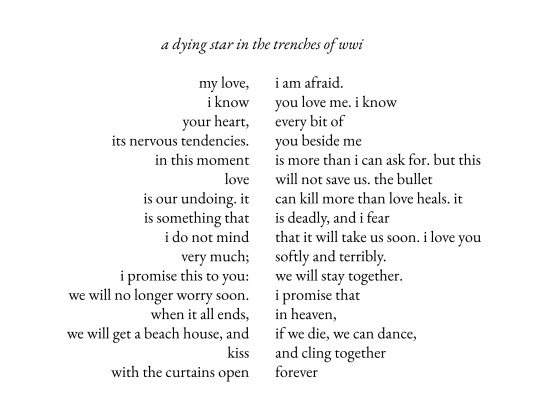
context: the two sides, read separately, are the two soldiers thinking about their futures with each other. when read together, it's a reflection of their final thoughts when they die together struck by bullets <3
8K notes
·
View notes
Text
Hey-oh!
I did the Patreon thing! I have three membership tiers - snippets (free), short story ($3/month) and novella ($5/month). I'll be sharing a good bit of free stuff so that you can catch the vibes of my work and decide if you want to continue.
I am mostly in this for growing my audience, so please, hop on over and drop a comment or two! I'd love to be able to support my coffee habit too, so if you feel like you'd like to read more of my work, hop on the $3 of $5 tier. (Note: Severed Threads is being moved to Patreon).
The post above is free to anyone, so you don't have to join to see what I'm offering. Please share!
Thanks, and I hope to see you on the next page!
4 notes
·
View notes
Text
"Kill your darlings!" I scream as I commit mass (literary) murder.
1 note
·
View note
Text
Writing Notes: Magic Systems
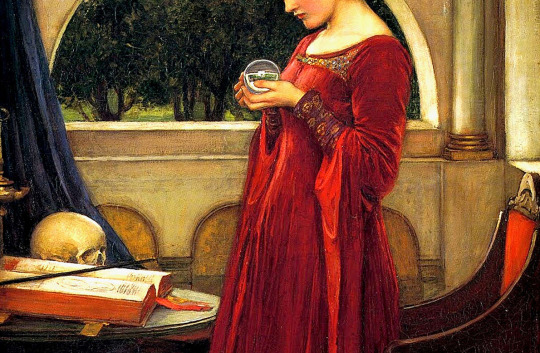
Magic - change wrought through unnatural means
Most fantasy can be placed along a spectrum where there are 3 main points: soft magic at one end, hard magic at the other, and a middle ground between the two.
Soft Magic
Magic that is not well-defined for the reader.
Generally, we don’t understand where the magic comes from, who can use it, or what its limitations are.
Readers can see this type of magic being used.
But they can never anticipate when magic will be used in the plot because they can’t begin to guess how it works.
You can’t break a rule if the rules don’t exist!
Most stories that feature this system will have the magic users be secondary characters, allowing them to avoid explaining exactly how the magic works.
It’s also argued that without knowing everything about the magic, it tends to hold more wonder and excitement for readers.
Hard Magic
Has very rigid boundaries.
Readers know where the magic comes from, how it’s used, who uses it, and what its boundaries and limitations are.
We know the limitations of the characters and can understand why they can’t simply magic themselves out of any particular challenge.
Stories with hard magic systems do not need to avoid the main character being a magic-wielder, as they have the capacity to explain to the reader what is going on.
A lot of writers this system because it gives them very explicit guidelines to follow in their plot and creates some more satisfying pay-offs for readers.
The Middle Ground
The meeting point between the soft and hard systems.
We might understand a bit about the way the magic works, but not all our questions are answered.
While most of the content adheres to rules, these rules aren’t fully explored.
This system relies on the reader’s suspension of disbelief.
The main character can be a magic-wielder or not, and it’s up to the writer to determine when magic will be used in terms of plot.
How to Choose a System
You can and should use these guiding principles to build your magic system. Remember that you don’t have to choose one or the other. Your system can draw from aspects of both. Just stay aware of the weaknesses of the path you choose, and ensure you utilize its strengths.
Use a hard magic system if:
You are going to use magic to solve problems
Your audience is accustomed to the tropes of hard magic
You are okay with jumping through hoops to expand your system
Your magic doesn’t convey a theme
Use a soft magic system if:
You want to convey a theme through magic
You want to create a sense of wonder
You want the ability to expand easily
You want to be accessible to a broader audience
Your magic won’t regularly be used to solve problems
Branches of Magic
Like most writing processes, there isn’t really a correct place to begin designing a magic system. A common, and efficient, place to start, however, is by choosing what type of magic system(s) you wish to employ, such as:
Nature-based magic: water, earth, fire, air, and everything in between
Divination magic: see beyond sight and peer through time and space
Conjuring magic: move objects through space over any distance
Psychic magic: master the world of the mind
Life and death magic: tap into the very forces of life, death, and un-death with this surprisingly versatile collection
Animal- or creature-exclusive magic: some creatures just do it better
Magitech systems: the blurring lines of sorcery and science give magic a next-gen, high-tech flair
Eclectic magic: it doesn’t have to be “real” magic to have a real effect
Uncommon magic systems: the unsung heroes of fantasy magic
AALC Method
How to create your own magic system using the AALC (Appearance, Abilities, Limits & Cost) Method
Appearance
What the magic looks like
Makes the world feel more exotic
Can cause problems for characters but cannot solve them
Usually tied to a character arc
Abilities
What the magic does
Points calculated based on magical effect, range, number of people affected, and duration
Characters have a finite amount of fuel (mana) to use abilities
More powerful abilities require more fuel
The fuel does not have to be overt for the audience to understand
If points not overt, cannot solve conflicts unless a cost system is added
Limits
Unlimited uses of magical abilities
Abilities stratified in codified levels defined by their limits
The more the levels' abilities and limits are known by the audience, the more they can be used to solve conflicts
Focused on clever uses of abilities against stronger foes
Cost system can be added to enhance dramatic moments
Cost
Costs must be greater than or equal to abilities to make them dramatically satisfying
Costs can include time, exhaustion, materials, sanity, morality, etc.
Adds dilemma to magic by forcing characters to make choices
The greater the character's sacrifice, the more audience satisfaction at conflict resolution

Each system builds on the previous ones, so that Cost Systems use all four, while Point Systems only care about Abilities and Appearance.
Multiple systems can exist within the same story, and systems can harden over the course of the story.
The Force, for instance, has been a Soft, Point, Level, and Cost System depending on who wrote it at the time.
SOFT SYSTEMS (Appearance Only)
Window Dressing - magic for secondary characters; can instigate conflict but cannot solve it; e.g., Gandalf
Soft Villain - No explanation or upper limits needed; makes villains more powerful to make heroes greater underdogs; e.g., The Emperor
Chosen One - Unknown power keeps hero safe throughout story; can be considered plot armor unless earned through character arc
Sort Hero Incomplete - Curse or positive ability the character cannot control; hero still learning limits of ability at story's end; powers and arc continued in next adventure
Soft Hero Complete - Hero embraces ability to complete arc and solve main conflict; magic must become harder in subsequent adventures
POINT SYSTEMS (Appearance + Abilities)
Points Opaque - Non-explicit reservoir of energy fuels powers; cannot solve main problems without cost option because characters finding hidden energy reserve feels like deus ex machina
Points Hard - Both abiliites and points system must be explicit like in video games; becomes about resource management; easy to understand but takes sense of wonder out of magic
LEVEL SYSTEMS (Appearance + Abilities + Limits)
Soft Level Static - Unchanging power without upper limits; cannot solve conflicts because feels repetitive; power must be used cleverly; e.g., Wolverine's healing factor
Soft Level Advancing - Increased powers or new powers with unknown limits; cannot solve conflicts unless tied to a character arc like Soft Hero Complete, at which point "unlocks" new abilities
Hard Level Static - Unchanging abilities with clear-cut limits; can solve conflicts so long as setup is properly seeded, usually resulting in sacrifice; e.g., Genie
Hard Level Advancing - Well-established abilities with limits; can solve conflicts based upon clever uses of abilities, usually against stronger foes; e.g., Airbender
COST SYSTEMS (Appearance + Abilities + Limits + Cost)
Static Cost - Well-established cost remains consistent for each use of ability; can solve conflicts since based on personal sacrifice
Cost Fluctuating - Costs change based upon dramatic need; costs must be greater than or equal to ability; possible costs include lost time, money, sanity, health, memory, life, morality, etc.
Sources: 1 2 3 4 5 6 ⚜ Writing Notes & References Writing Notes: Magic System ⚜ Fictional Items; Poisons ⚜ Fantasy
948 notes
·
View notes
Text
When I write a story, I don’t see it as a book, I see it like a movie or a TV show, visually watching the story unfold before me and I imagine and hope that someday people will see my stories the same way that I do.
2K notes
·
View notes
Text
Hey hi hello!
Long story short: ITS PATREON TIME BABEEEEEE.
Long story medium: it's time for me to branch out to a platform that allows me a bit more control over my content.
I'll eventually link my patreon here and do an explanation of what all is there, but for now, I have a Question.
What would you want to see from an author's Patreon? What questions would you ask? What would you want to know?
Hit me upppp!
3 notes
·
View notes
Text
Being a writer is like being a chef — you mix in some words, hope they don’t burn, and pray no one notices the plot twist undercooked.
307 notes
·
View notes
Text
i sat down to write a single scene and somehow created three subplots, an emotional breakdown, and a character i’ll never use again. writer efficiency is a myth.
940 notes
·
View notes
Text
people trying to insist a fandom is tiny when it /only/ has a few thousand works on ao3 meanwhile my current fandom is a sixteen book series and has several hundred fewer works than goncharov, a movie that, and i cannot stress this enough, doesn’t even exist
57K notes
·
View notes
Text
I hate to say this, and like, rain on everyone’s parade, but after scrolling past three posts about it on a writing tag …
If you are looking up synonyms to exchange words out in your story with the purpose of sounding smarter, more sophisticated, or complicated to your reader, you are probably abusing the thesaurus.
Now, if you *want* to do this, I mean, you can write whatever or however you want! But I just want you to know that this is frowned upon if you are trying to write at a professional level.
I have an old article on this somewhere …


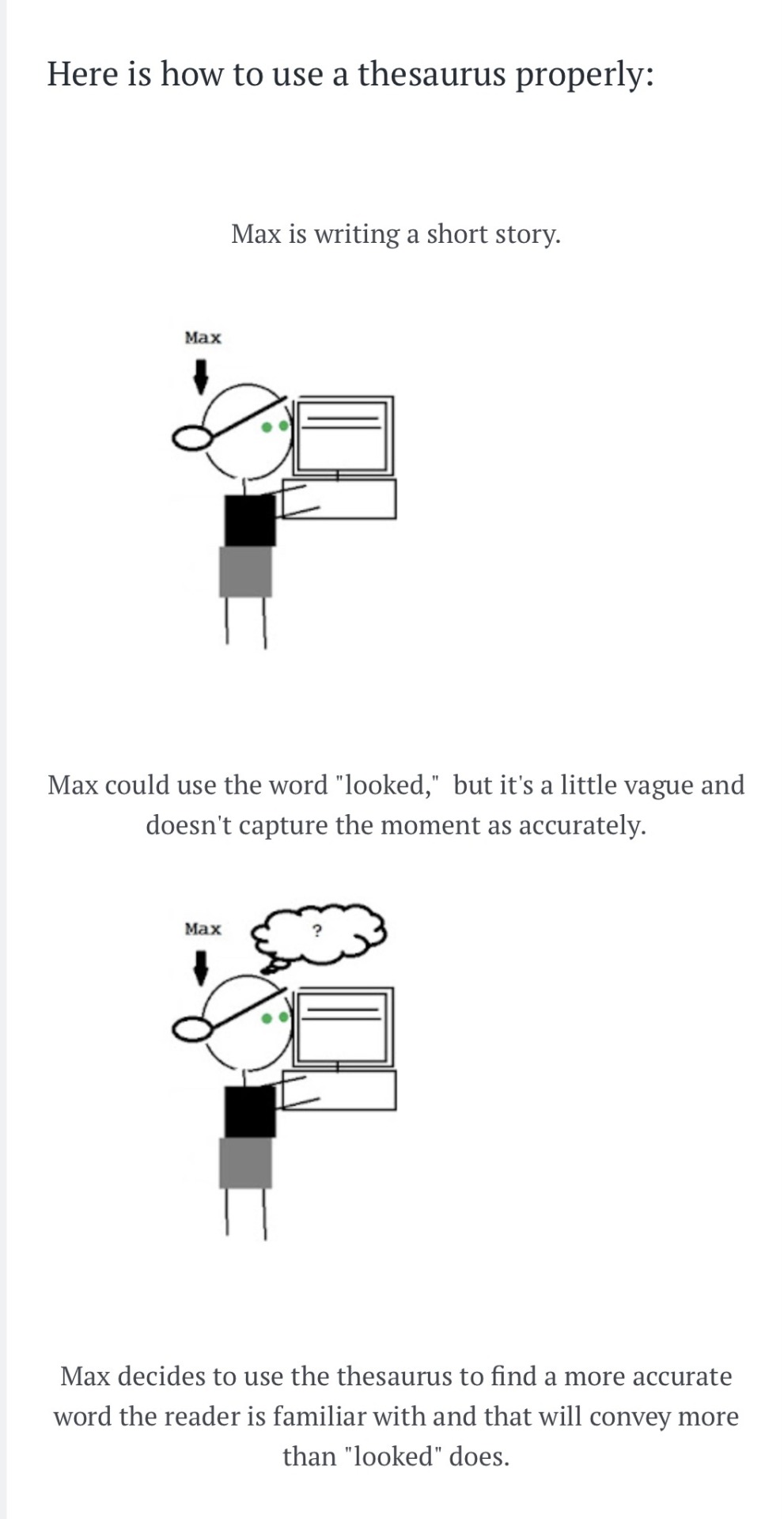
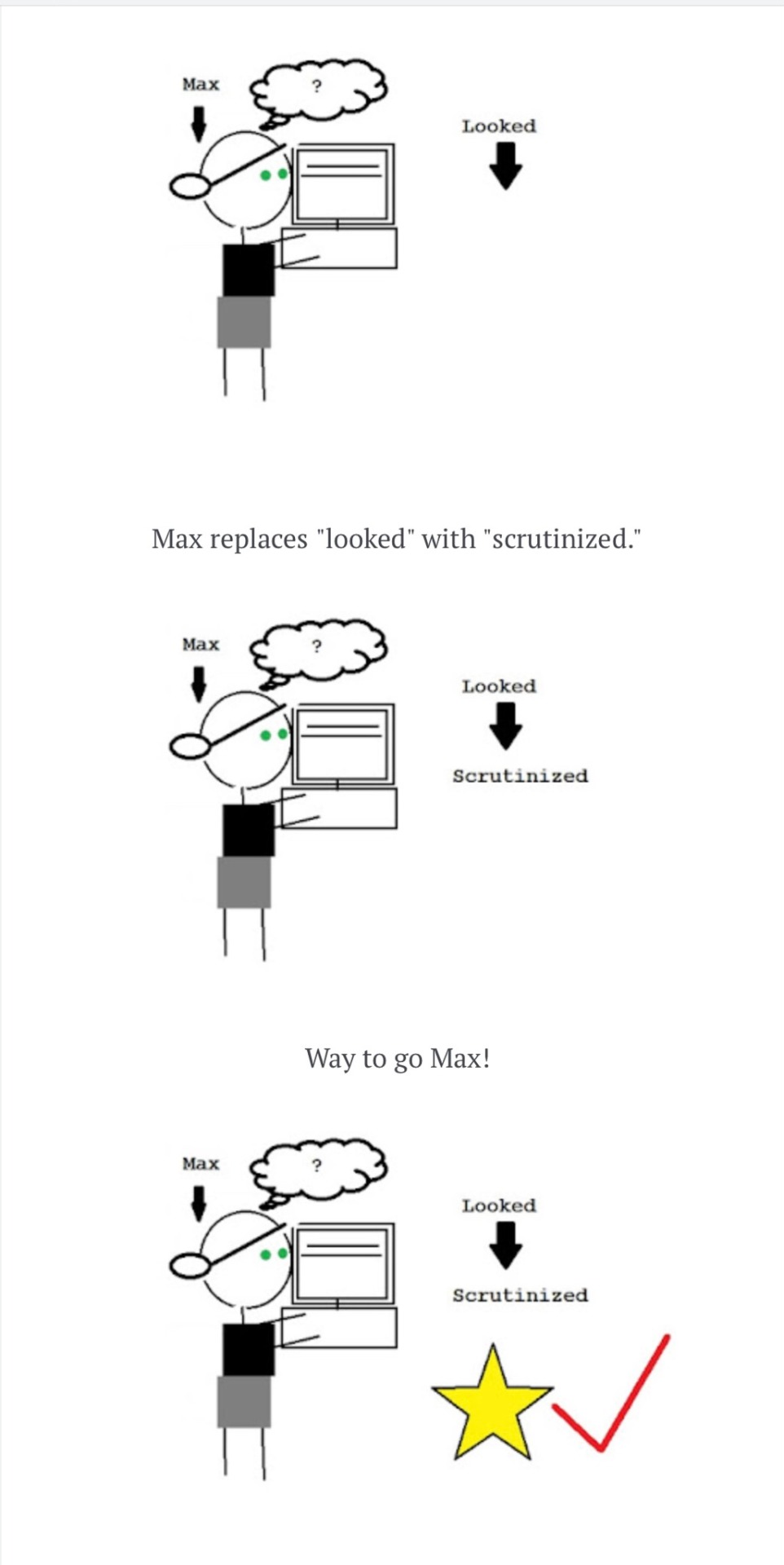
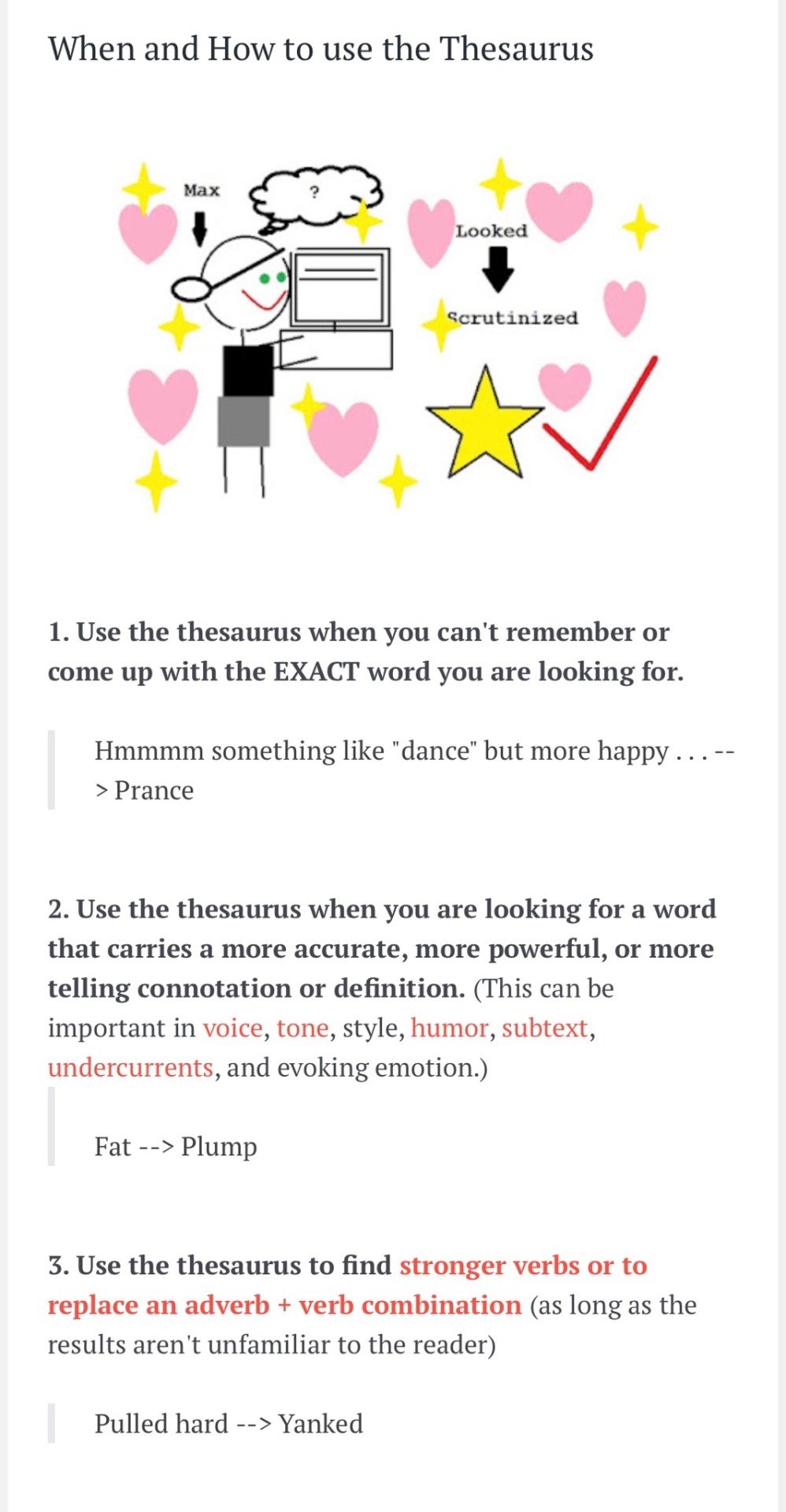
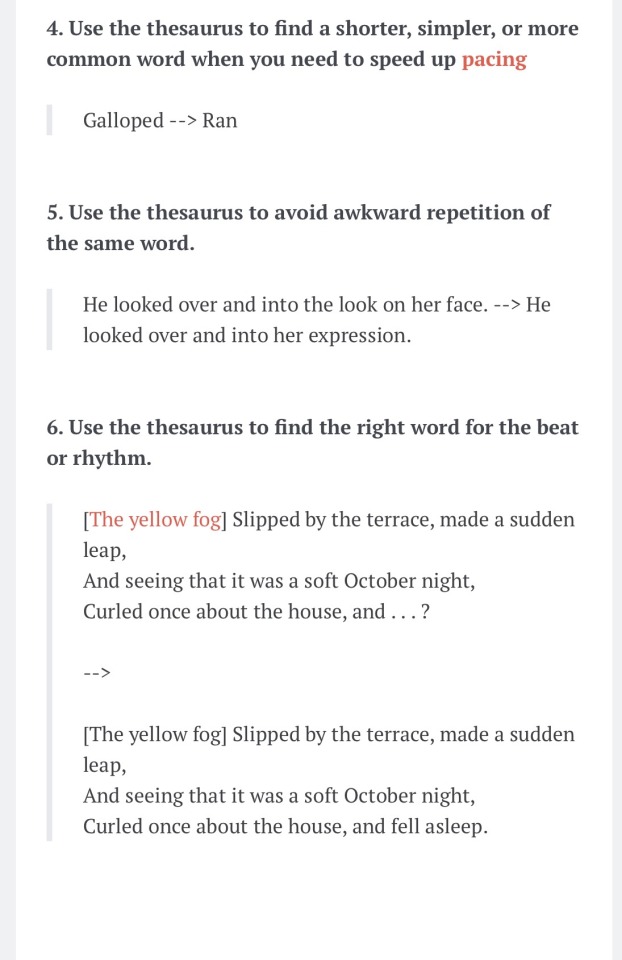
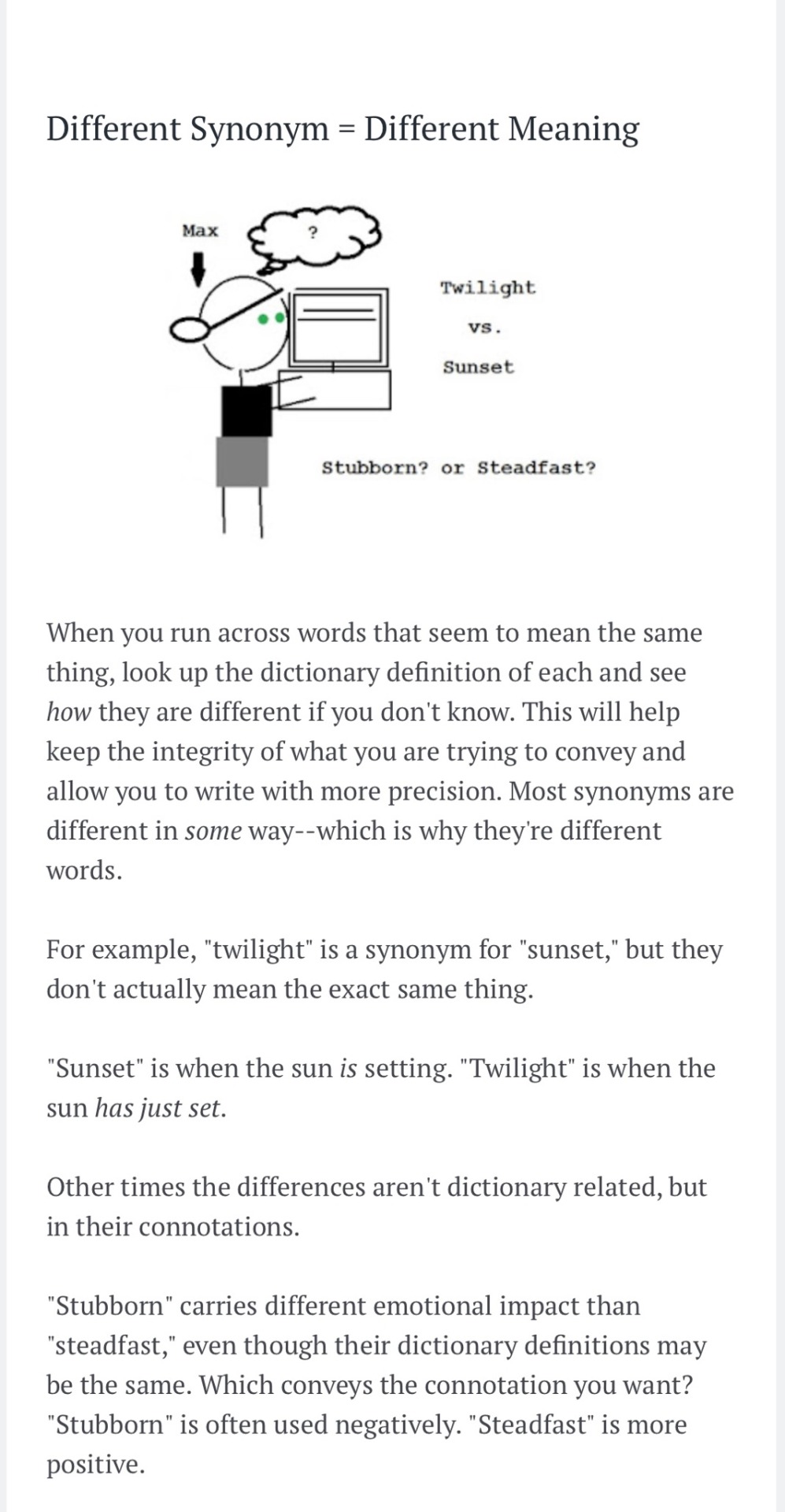
If you want to look at the original article…
https://www.septembercfawkes.com/2018/08/how-to-use-thesaurus-properly.html
10K notes
·
View notes
Text
sometimes writing feels less like creating and more like trying to unravel a very stubborn knot of vibes.
1K notes
·
View notes


